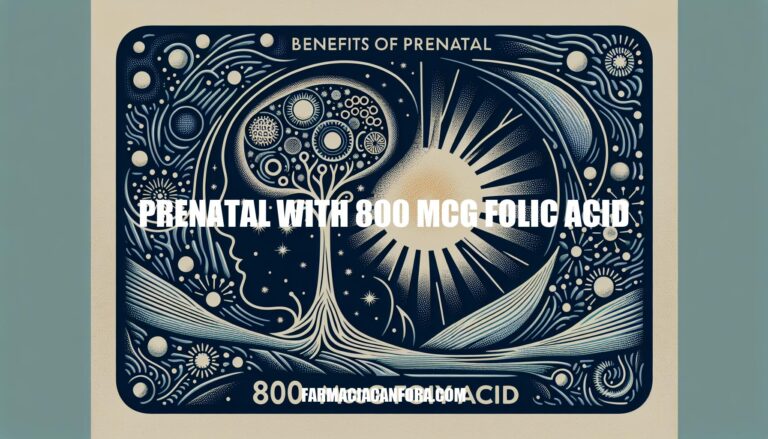


Prenatal vitamins are essential for a healthy pregnancy, providing vital nutrients for both mother and baby. One key component is folic acid, especially in doses of 800 mcg. Folic acid is crucial because it helps prevent neural tube defects, which are serious birth defects of the brain and spine. Taking folic acid before and during early pregnancy significantly reduces these risks, supporting healthy development.
Taking prenatal vitamins with 800 mcg of folic acid offers several specific benefits:
Prevention of Neural Tube Defects: Folic acid is crucial in preventing neural tube defects such as spina bifida and anencephaly. These defects occur in the early stages of pregnancy, often before a woman knows she is pregnant.
Support for Overall Fetal Development: Folic acid supports the development of the baby’s brain and spinal cord. It also aids in the formation of DNA and RNA, which are essential for cell division and growth.
Reduction of Other Birth Defects: Folic acid may help reduce the risk of other birth defects, including those affecting the heart and limbs.
Prevention of Pregnancy Complications: Adequate folic acid intake can help prevent complications such as preeclampsia and early pregnancy loss (miscarriage).
Maternal Health: Folic acid supports the mother’s health by aiding in the production of red blood cells, which can prevent anemia.
Taking prenatal vitamins with 800 mcg of folic acid is a proactive step to ensure both maternal and fetal health during pregnancy.
The recommended dosage of folic acid in prenatal vitamins is typically 400 to 800 micrograms (mcg) per day. For women with higher risk factors for neural tube defects, a higher dose of 4-5 milligrams (mg) may be advised.
Optimal timing for starting folic acid supplementation is at least one month before conception and continuing through the first 12 weeks of pregnancy. This timing is crucial as it helps prevent neural tube defects during the early stages of fetal development.
Here are some sources where you can obtain prenatal vitamins with 800 mcg folic acid:
Over-the-Counter Options:
Prescription Supplements:
Taking prenatal vitamins with 800 mcg of folic acid is generally safe and often recommended during pregnancy to prevent neural tube defects (NTDs) in the developing baby. However, some studies suggest that taking 800 mcg or more may be associated with an increased risk of gestational hypertension.
Potential side effects:
Precautions:
Always follow your healthcare provider’s guidance for the best outcomes.
Prenatal vitamins with 800 mcg of folic acid are essential for a healthy pregnancy, providing vital nutrients for both mother and baby. They help prevent neural tube defects, support overall fetal development, reduce other birth defects, prevent pregnancy complications, and promote maternal health.
The recommended dosage is typically 400 to 800 micrograms per day, with optimal timing starting at least one month before conception and continuing through the first 12 weeks of pregnancy. Taking prenatal vitamins with 800 mcg folic acid is generally safe but may be associated with an increased risk of gestational hypertension in some cases.
It’s crucial to consult with a healthcare provider before starting any new supplement and follow their guidance for the best outcomes.